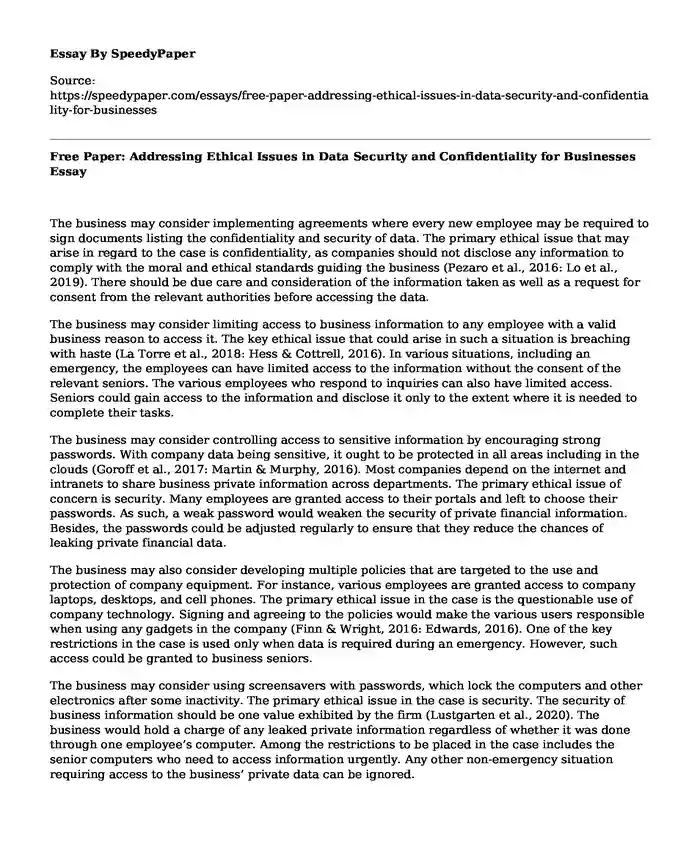The business may consider implementing agreements where every new employee may be required to sign documents listing the confidentiality and security of data. The primary ethical issue that may arise in regard to the case is confidentiality, as companies should not disclose any information to comply with the moral and ethical standards guiding the business (Pezaro et al., 2016: Lo et al., 2019). There should be due care and consideration of the information taken as well as a request for consent from the relevant authorities before accessing the data.
The business may consider limiting access to business information to any employee with a valid business reason to access it. The key ethical issue that could arise in such a situation is breaching with haste (La Torre et al., 2018: Hess & Cottrell, 2016). In various situations, including an emergency, the employees can have limited access to the information without the consent of the relevant seniors. The various employees who respond to inquiries can also have limited access. Seniors could gain access to the information and disclose it only to the extent where it is needed to complete their tasks.
The business may consider controlling access to sensitive information by encouraging strong passwords. With company data being sensitive, it ought to be protected in all areas including in the clouds (Goroff et al., 2017: Martin & Murphy, 2016). Most companies depend on the internet and intranets to share business private information across departments. The primary ethical issue of concern is security. Many employees are granted access to their portals and left to choose their passwords. As such, a weak password would weaken the security of private financial information. Besides, the passwords could be adjusted regularly to ensure that they reduce the chances of leaking private financial data.
The business may also consider developing multiple policies that are targeted to the use and protection of company equipment. For instance, various employees are granted access to company laptops, desktops, and cell phones. The primary ethical issue in the case is the questionable use of company technology. Signing and agreeing to the policies would make the various users responsible when using any gadgets in the company (Finn & Wright, 2016: Edwards, 2016). One of the key restrictions in the case is used only when data is required during an emergency. However, such access could be granted to business seniors.
The business may consider using screensavers with passwords, which lock the computers and other electronics after some inactivity. The primary ethical issue in the case is security. The security of business information should be one value exhibited by the firm (Lustgarten et al., 2020). The business would hold a charge of any leaked private information regardless of whether it was done through one employee’s computer. Among the restrictions to be placed in the case includes the senior computers who need to access information urgently. Any other non-emergency situation requiring access to the business’ private data can be ignored.
The business may also consider performing background checks to evaluate the capacities of employees who work with private business data. Some other situations would involve references to ensure that company information is placed in the right hands. The primary ethical issue in the case would be discordance. Proper evaluation can be effected on the employees to ensure that they can protect the information regardless of their lack of consistency (Mittelstadt & Floridi, 2016). The exceptions in such a case would include the various employees taken in for temporary commitment yet are already qualified for the tasks to be accomplished.
References
Edwards, L. (2016). Privacy, security, and data protection in smart cities: A critical EU law perspective. SSRN Electronic Journal. https://doi.org/10.2139/ssrn.2711290
Finn, R. L., & Wright, D. (2016). Privacy, data protection, and ethics for civil drone practice: A survey of the industry, regulators, and civil society organizations. Computer Law & Security Review, 32(4), 577-586. https://doi.org/10.1016/j.clsr.2016.05.010
Goroff, D., Polonetsky, J., & Tene, O. (2017). Privacy protective research: Facilitating ethically responsible access to administrative data. The ANNALS of the American Academy of Political and Social Science, 675(1), 46-66. https://doi.org/10.1177/0002716217742605
Hess, M. F., & Cottrell, J. H. (2016). Fraud risk management: A small business perspective. Business Horizons, 59(1), 13-18. https://doi.org/10.1016/j.bushor.2015.09.005
La Torre, M., Dumay, J., & Rea, M. A. (2018). Breaching intellectual capital: Critical reflections on big data security. Meditari Accountancy Research, 26(3), 463-482. https://doi.org/10.1108/medar-06-2017-0154
Lo, A. Y., Grotevant, H. D., & McRoy, R. G. (2019). Ethical considerations in adoption research: Navigating confidentiality and privacy across the adoption kinship network. Adoption Quarterly, 22(1), 75-93. https://doi.org/10.1080/10926755.2018.1488328
Lustgarten, S. D., Garrison, Y. L., Sinnard, M. T., & Flynn, A. W. (2020). Digital privacy in mental healthcare: Current issues and recommendations for technology use. Current Opinion in Psychology, 36, 25-31. https://doi.org/10.1016/j.copsyc.2020.03.012
Martin, K. D., & Murphy, P. E. (2016). The role of data privacy in marketing. Journal of the Academy of Marketing Science, 45(2), 135-155. https://doi.org/10.1007/s11747-016-0495-4
Mittelstadt, B. D., & Floridi, L. (2016). The ethics of big data: Current and foreseeable issues in biomedical contexts. Law, Governance, and Technology Series, 445-480. https://doi.org/10.1007/978-3-319-33525-4_19
Pezaro, S., Clyne, W., & Gerada, C. (2016). Confidentiality, anonymity, and amnesty for midwives in distress seeking online support – Ethical? Nursing Ethics, 25(4), 481-504. https://doi.org/10.1177/0969733016654315
Cite this page
Free Paper: Addressing Ethical Issues in Data Security and Confidentiality for Businesses. (2023, Nov 05). Retrieved from https://speedypaper.net/essays/free-paper-addressing-ethical-issues-in-data-security-and-confidentiality-for-businesses
Request Removal
If you are the original author of this essay and no longer wish to have it published on the SpeedyPaper website, please click below to request its removal:
- Volvo Group Essay Sample
- Essay Example on Importance of Global Marketing of Jim Beam Brand
- Free Essay on How You Know What Your Customers Want?
- Paper Example. Small Business in International Setting
- Essay Sample on The Decision of LG Corporation
- The "A-Team" Truthfully Representing Your Company. Free Essay
- Adapting to Change: COVID-19's Impact on Consumer Behaviors in the Service Industry - Essay Example
Popular categories





